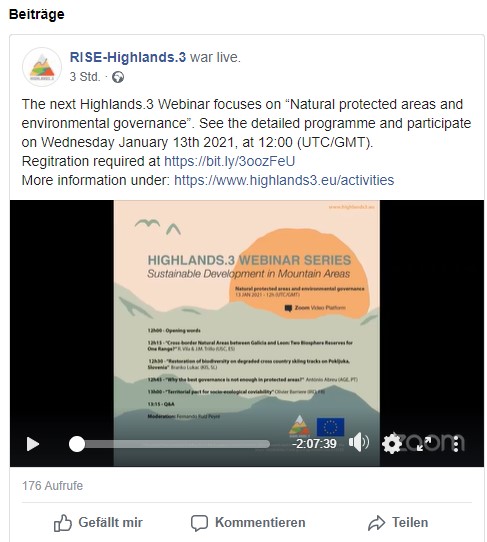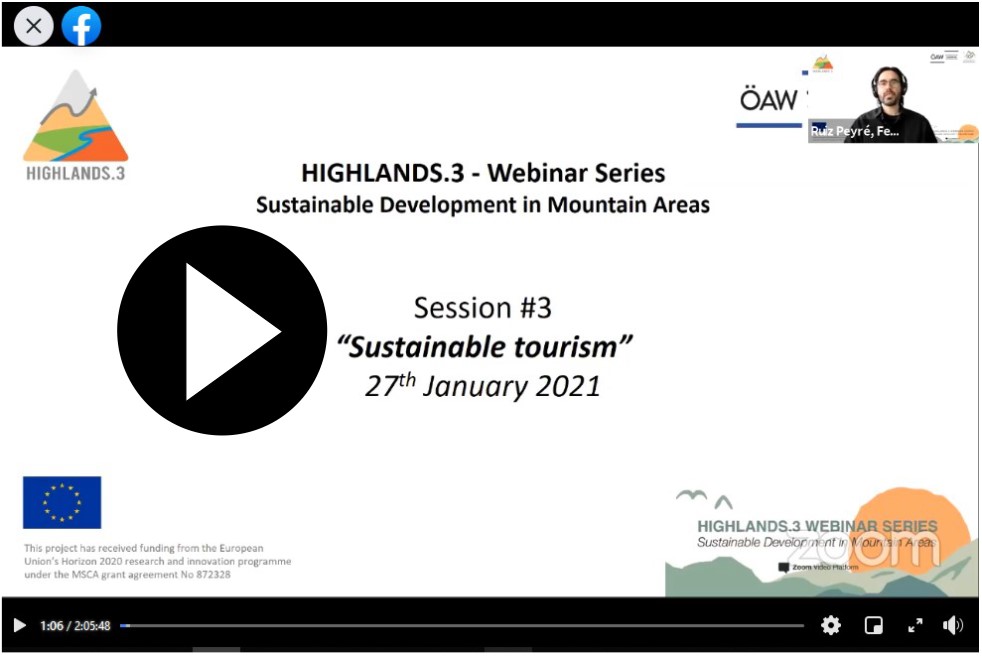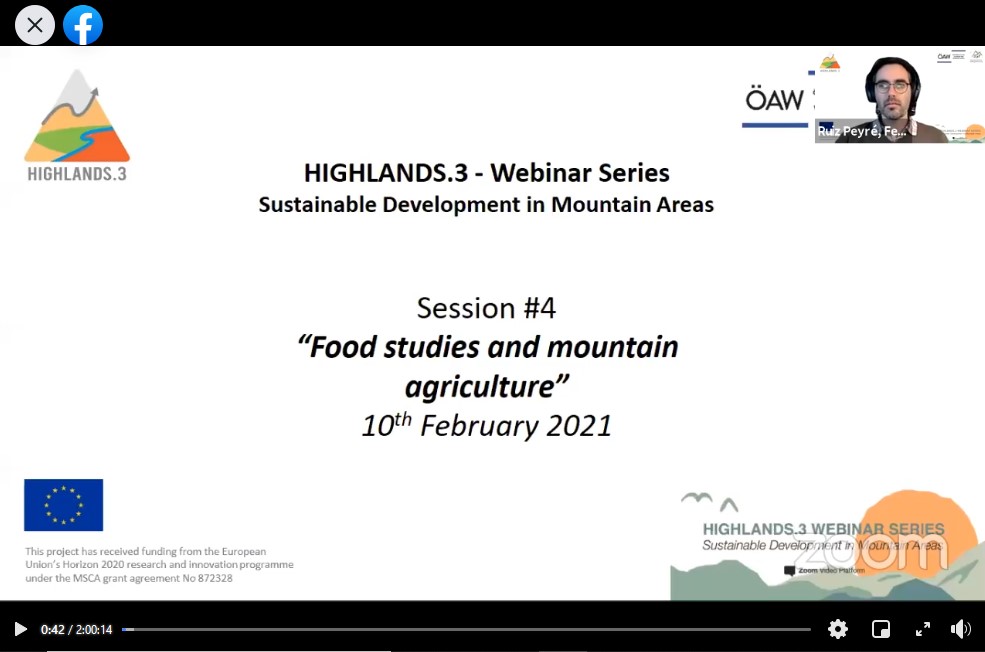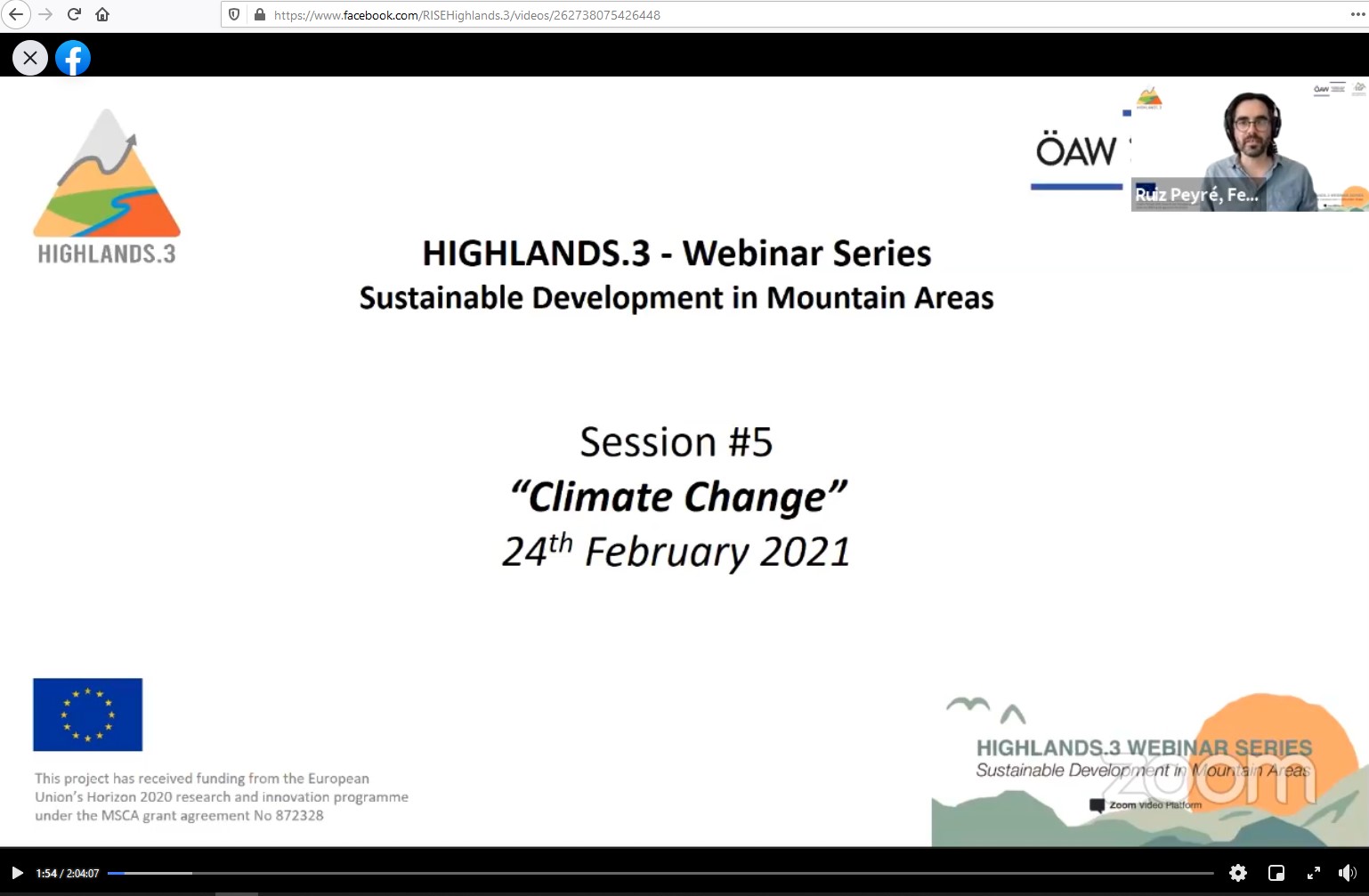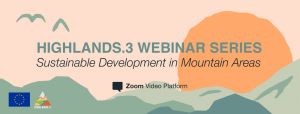
H3-Webinar Series - Session 2
Sustainable Development in Mountain Areas
Natural protected areas and environmental governance
Presentations
R. Vila & J.M. Trillo (Universidad de Santiago De Compostela, Spain):
“Cross-border Natural Areas between Galicia and Leon: Two Biosphere Reserves for One Range?”
↗Presentation (PDF)
Branko Lukac (Agricultural Institute Of Slovenia, Slovenia):
“Restoration of biodiversity on degraded cross country skiing tracks on Pokljuka, Slovenia”
↗Presentation (PDF)
António Abreu (Associação Geopark Estrela, Portugal):
“Why the best governance is not enough in protected areas?”
Olivier Barriere (Institut de Recherche pour le Developpement, France):
“Territorial pact for socio-ecological coviability”
↗Presentation (PDF)
Link to facebook live:
Hier you can see the webinar again.
 https://www.facebook.com/RISEHighlands.3/videos/421802222379203/
https://www.facebook.com/RISEHighlands.3/videos/421802222379203/
<<< Session 1: "International Mountain Day"
Session 3: "Sustainable Tourism" >>>
Follow us in the social media
https://www.facebook.com/RISEHighlands.3/
https://twitter.com/Highlands_3
https://www.instagram.com/highlands.3/
H3-Webinar Series - Session 3
Sustainable Development in Mountain Areas
Sustainable tourism
The success achieved through tourism in numerous regions in the developed world has given rise to hopes and expectations in the developing world. However, tourism development in highland regions depends on many factors – from the attractiveness, culture, safety, professionalism of local businesses and hospitality structures to the availability of investment capital. Tourism has been labelled as the “holy Grail” or a panacea for the economic, social and natural development of highlands. Though this may be a seasonal reality in some places, these communities must still have livelihoods in “off seasons”. Equally, in some regions the development of tourism has had disastrous results, with only short-lived economic development. Tourism can bring positive and negative outcomes. However, if well managed, tourism contributes to inclusive local development. Local stakeholders can have significant roles, through employment, engaging in business or social initiatives. Integrating local communities can contribute towards building a society that is conscious of this importance.
Presentations
“Potentialities of territorial development with sustainable production and tourism: the case of the Fourth Colony - Rio Grande do Sul/ Brazil” R. Verdruscolo (TLS, FR; UFSM, BR), M. Mezzomo (UFSM, BR) & J.-F. Tourrand (TLS, FR)
↗Presentation (PDF)
“LOFOTLAM – Make jobs and keep the landscape open” G. Karlsen (LOFOTLAM, NO)
↗Presentation (PDF)
“Learning together. Estrela Geopark strategic view and local partners environment roots” P. Jerónimo (AGE, PT)
↗Presentation (PDF)
“Less Is (Not) Better. Undertourism in the Galician Mountains?” M. Agrelo, V. Paül & J.M. Trillo (USC, ES)
↗Presentation (PDF)
“Alpine huts as pioneers to a socio-ecological transformation. A monitoring system to enhance sustainability in touristic mountain regions” J. Balling, D. Segat & J. Kister (UIBK, AT)
↗Presentation (PDF)
Link to facebook live:
Hier you can see the webinar again.
 https://www.facebook.com/RISEHighlands.3/videos/709052476408694
https://www.facebook.com/RISEHighlands.3/videos/709052476408694
<<< Session 2: "Protected Areas"
Session 4: "Food Studies and Mountain Agriculture" >>>
Follow us in the social media
https://www.facebook.com/RISEHighlands.3/
https://twitter.com/Highlands_3
https://www.instagram.com/highlands.3/
H3-Webinar Series - Session 4
Sustainable Development in Mountain Areas
Food studies and mountain agriculture
Presentations
E. Sturaro (U. of Padova, IT): “Added value of mountain livestock systems: initiatives in eastern Italian Alps”.
↗Presentation (PDF)
M.A. Karatzia, D. Karatosidi, D. Tsiokos (HAO-Demeter, GR), D. Gaki (Terra Thessalia, GR) & C. Ligda (HAO-Demeter, GR): “Sustainability of livestock systems in Pindos mountain range”.
↗Presentation (PDF)
R. Boga & V. Paül (U. of Santiago de Compostela, ES): “A Food Overview of the Eastern Mountains of Galicia: Institutionalised Geographical Indications Conditioned by the Administrative Boundary?”.
↗Presentation (PDF)
M. Chedid (American University of Beirut, LB): “Promoting traditional mountain foods: a case-study from the West Bekaa and Chouf of Lebanon”.
↗Presentation (PDF)
M. Houdart, E. Polge (INRAE, FR), M. Capitaine, S. Cournut, V. Baritaux, S. Loudiyi (VetAgroSup, FR), E. Clair, E. Cournut & D. Vergnaud (PNR Livradois Forez, FR): “Reterritorialization of food and integration of mountain and urban areas: illustration from the Territorial Food Project of Grand Clermont and Livradois Forez”.
↗Presentation (PDF)
Questions & Answers Report: ↗Q&A Report
Link to facebook live:
Hier you can see the webinar again:
![]() https://www.facebook.com/RISEHighlands.3/videos/718728538839397
https://www.facebook.com/RISEHighlands.3/videos/718728538839397
<<< Session 3: "Sustainable Tourism"
Session 5: "Climate Change" >>>
Follow us in the social media
https://www.facebook.com/RISEHighlands.3/
https://twitter.com/Highlands_3
https://www.instagram.com/highlands.3/
H3-Webinar Series - Session 5
Sustainable Development in Mountain Areas
Climate Change in Mountain Areas
Presentations
“Climate change impacts in mountain environments: a short introduction.” Gonçalo Vieira (IGOT/AGE, PT)
↗Presentation (PDF)
“Pollinators in high elevation protected areas and species shifts due to climate change.” Gillian Bowser (TMI, PE/ Colorado S. University, US)
↗Presentation (PDF)
“Impacts of climate changes on ecosystem services in the Southern Andes.” Ricardo Villalba (IANIGLA/CONICET, AR)
↗Presentation (PDF)
“Alpine glaciers as icons and archives of climate change.” Andrea Fischer (IGF/ÖAW, AT)
↗Presentation (PDF)
“Forest fire risk assessment methodology, a climate change mitigation strategy.” Luis Santos (IP Tomar, PT)
↗Presentation (PDF)
Questions & Answers Report: ↗Q&A Report
Moderation: Fernando Ruiz Peyré (IGF/ÖAW, AT) and Hugo Gomes (AGE, PT)
Link to facebook live:
Hier you can see the webinar again:
![]() https://www.facebook.com/RISEHighlands.3/videos/262738075426448
https://www.facebook.com/RISEHighlands.3/videos/262738075426448
Starting time: 12:00 UTC/GMT
19:00 Hanoi (UTC +7)
15:00 Dar es Salaam (UTC +3)
13:00 Vienna/Paris/Roma (CET/UTC +1))
12:00 Lisbon/London (GMT/UTC)
09:00 Rio de Janeiro/Buenos Aires (UTC -3)
07:00 New York/Lima (UTC -5)
<<< Session 4: "Food Studies and Mountain Agriculture"
Follow us in the social media
https://www.facebook.com/RISEHighlands.3/
https://twitter.com/Highlands_3
https://www.instagram.com/highlands.3/
Highlands.3 – First Research and Innovation Session (R&IS), France and Spain (September-October, 2021)
In September and October, the first Research and Innovation Session of the project Highlands.3 took place in France and Spain, gathering about 35 participants from 15 countries. This marks the start of the interdisciplinary research activities in this project coordinated by the Institute for Interdisciplinary Mountain Research of the Austrian Academy of Science.
During September and October 2021, the first Research and Innovation Session of the project Highlands.3 took place, gathering about 35 participants from 15 countries. The session was organized by the French partners, Parc Naturel Régional Livradois-Forez, The Livestock Sustainability, INRAE and VetAgro Sup. Due to the pandemic, this was the first large research activity of the Highlands.3 project, led by the Institute for Interdisciplinary Mountain Research of the Austrian Academy of Science.
During four weeks, the group conducted interviews with representatives of around 50 initiatives for local and sustainable development in Massif Central (France) and in the Pyrenees (France and Spain). The main objective of this first session was the definition of a joint methodology, appropriate for inter- and transdisciplinary research on sustainable development in highlands. Scientists from fields as diverse as geography, biology, economics, sociology, animal science, veterinary science, architecture, archaeology, as well as practitioners engaged in this challenging task.
Seven other similar month-long sessions will be organised around the world over the next four years: four in Europe, one in Africa, one in South America and one in Asia. Each session will bring together dozens of scientists from different disciplines, identifying, visiting and analysing about 50 local initiatives following the new pre-established interdisciplinary methodology.
The main goal of these activities is the creation of a decision support platform gathering a large number of initiatives for sustainable development in mountain areas. This platform will inform local actors, stakeholders, decision-makers, managers, technicians, scientists, students... who will be able to select the most relevant initiatives for their territory or interests, contact the key persons of these, interact and learn from each other.

